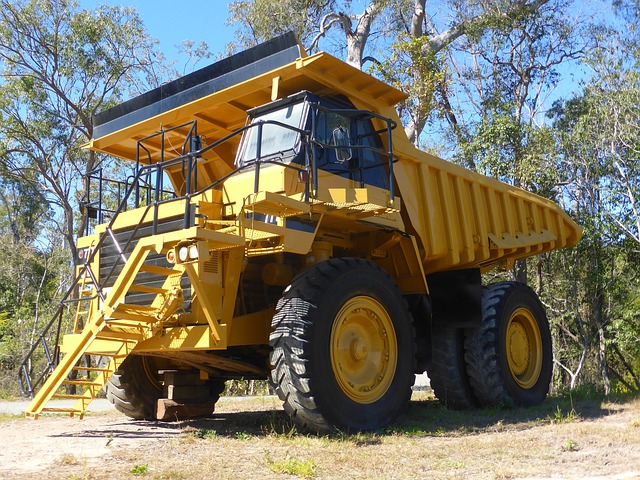In the commercial trucking sector, having robust rental truck insurance is crucial for protecting against costly damages and operational disruptions. This guide comprehensively covers rental truck insurance policies, detailing the various types of coverage such as liability protection, collision coverage, and cargo insurance to help businesses navigate their options based on risk tolerance and financial considerations. It's important for businesses to understand these coverages to make informed decisions that align with their operational needs, especially considering the unique challenges faced in the trucking industry. For personal use, ensure you grasp the liability coverage within your rental agreement to avoid bearing excessive financial burdens in case of accidents. Additional endorsements like cargo insurance and roadside assistance are essential for safeguarding against loss or damage of goods and unforeseen vehicle issues, respectively. When choosing an insurance policy, it's vital to compare coverage options from various providers, taking into account their claim history and customer service reputation to ensure reliable protection on the road. Tailor your insurance selection to match the nature of your trucking activities—whether for local deliveries or long-distance hauls—ensuring that your policy addresses the specific risks of your operations. Keyword: Trucking.
When venturing into the trucking industry or undertaking significant transportation tasks, securing reliable rental truck insurance is paramount. This article serves as a robust guide for businesses navigating the complexities of rental truck insurance. It delves into the critical aspects of coverage, emphasizing liability and the additional protections available, such as cargo insurance, roadside assistance, and accident policies. Furthermore, it offers actionable tips to help businesses select the most suitable rental truck insurance provider in the competitive market, ensuring peace of mind on the road.
- Understanding Rental Truck Insurance: A Comprehensive Guide for Businesses
- The Importance of Liability Coverage in Rental Truck Agreements
- Evaluating Additional Protections: Cargo, Roadside Assistance, and Accident Policies
- Navigating the Market: Tips for Selecting the Best Rental Truck Insurance Provider
Understanding Rental Truck Insurance: A Comprehensive Guide for Businesses

When a business relies on rental trucks as part of its operations, it’s imperative to safeguard against unforeseen events that could disrupt services or incur costly damages. Rental truck insurance acts as a protective shield for commercial enterprises, offering a suite of coverage options tailored to the unique demands of the trucking industry. This guide demystifies the intricacies of rental truck insurance, ensuring businesses understand their policy’s scope and limitations. It’s crucial to evaluate the various types of coverage available, such as liability protection, collision coverage, and cargo insurance, which address potential financial losses from vehicle accidents or freight damage. Understanding these aspects can help businesses make informed decisions that align with their risk tolerance and budgetary constraints. Engaging with a knowledgeable insurance provider is key; they can navigate the complexities of rental truck policies, providing customized advice to fit a company’s specific needs in the dynamic trucking sector.
The Importance of Liability Coverage in Rental Truck Agreements

When renting a truck for commercial or personal use, liability coverage is a critical aspect of the rental agreement. It shields renters from financial responsibility in the event of an accident involving the rental truck, mitigating potential legal and financial repercussions. Without adequate coverage, individuals or businesses could face significant costs related to property damage or injury to third parties, which can be particularly burdensome when operating larger vehicles. It’s prudent to carefully review the terms of liability coverage within a rental truck agreement, ensuring that it aligns with the specific needs of the operation to prevent unforeseen expenses. In the context of trucking operations, where the risk of accidents is inherently higher due to the size and use of trucks, having robust liability coverage is not just a precaution but a necessary measure to ensure the continuity and safety of the business.
Furthermore, understanding the nuances of liability coverage in rental truck agreements can save time, resources, and legal complications post-incident. Policies may vary between rental companies, and some may offer limited coverage or specific exclusions. It’s essential to confirm the scope of coverage, including what is and isn’t included, such as cargo liability or cross-border transportation. Rental truck users should consider purchasing additional coverage if the standard policy does not adequately protect against potential losses. This added protection can be the difference between a manageable setback and a crippling financial blow in the event of an incident involving the rental truck.
Evaluating Additional Protections: Cargo, Roadside Assistance, and Accident Policies

When considering rental truck insurance for your commercial or personal moving needs, it’s crucial to evaluate the additional protections available beyond the basic policy. These protections, often referred to as endorsements, can offer peace of mind and financial security should unforeseen events occur during your trucking operation. For instance, cargo insurance is designed to cover the replacement cost of goods transported within the rental truck in case of loss or damage, which is particularly valuable for high-value items or sensitive cargo that could be subject to theft, weather damage, or collision. Furthermore, roadside assistance coverage ensures support in unexpected scenarios such as vehicle breakdowns, flat tires, or out-of-fuel situations, minimizing downtime and keeping your operations moving smoothly. Accident policies are tailored to provide comprehensive protection against accidents involving the rental truck, which can cover a wide range of incidental damages that could otherwise result in significant expenses. Each of these additional protections serves a distinct purpose within the realm of trucking insurance, complementing the primary policy to create a robust safety net for your rental truck endeavors.
Navigating the Market: Tips for Selecting the Best Rental Truck Insurance Provider

When considering rental truck insurance, it’s crucial to compare options from various providers to find the most comprehensive coverage tailored to your trucking needs. Look for policies that offer robust protection against unforeseen events such as accidents, theft, or damages. Additionally, assess the financial stability and reputation of the insurer to ensure they can honor claims when necessary. A reliable insurance provider should have a track record of prompt claim processing and customer service support, which can be invaluable on the road.
Another key factor in selecting the best rental truck insurance is understanding the specific coverage options available. Different providers may offer unique benefits or exclusions, so it’s essential to thoroughly review what each policy includes. For instance, some policies might cover cargo while others might not, and certain carriers may specialize in long-haul versus short-trip rental truck insurance. Tailor your search to match the type of rental trucking you engage in, whether for local deliveries or cross-country trips, to secure a policy that aligns with your operational risks and exposures.
When securing a rental truck for business operations, it’s crucial to have robust insurance coverage tailored to your specific needs. This article has provided a clear understanding of rental truck insurance, highlighting the importance of liability coverage and the additional protections available, such as cargo insurance, roadside assistance, and accident policies. By carefully evaluating your options and selecting the right provider, businesses can navigate the market confidently, knowing they are well-protected. In conclusion, investing in professional support for rental truck insurance is not just a precautionary step but an essential aspect of responsible trucking management, ensuring peace of mind and safeguarding against potential financial losses.
